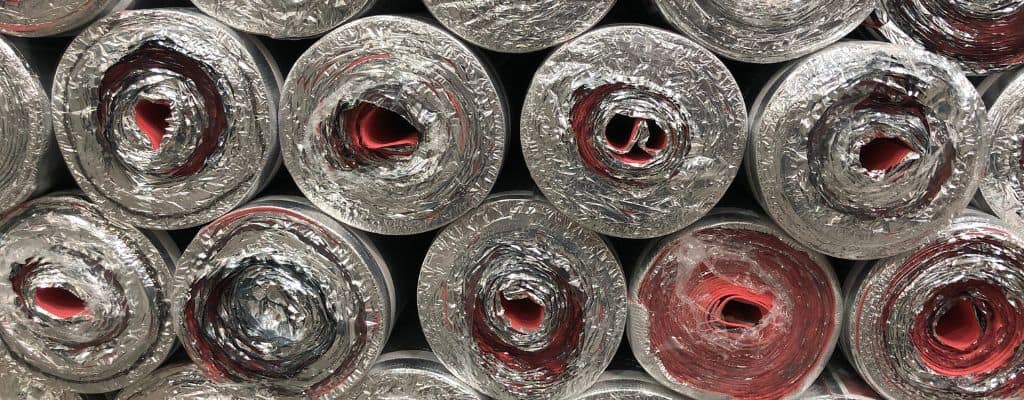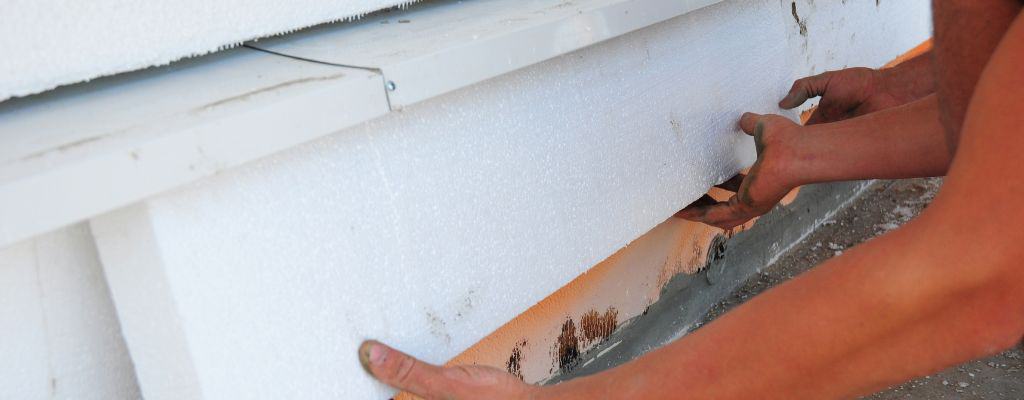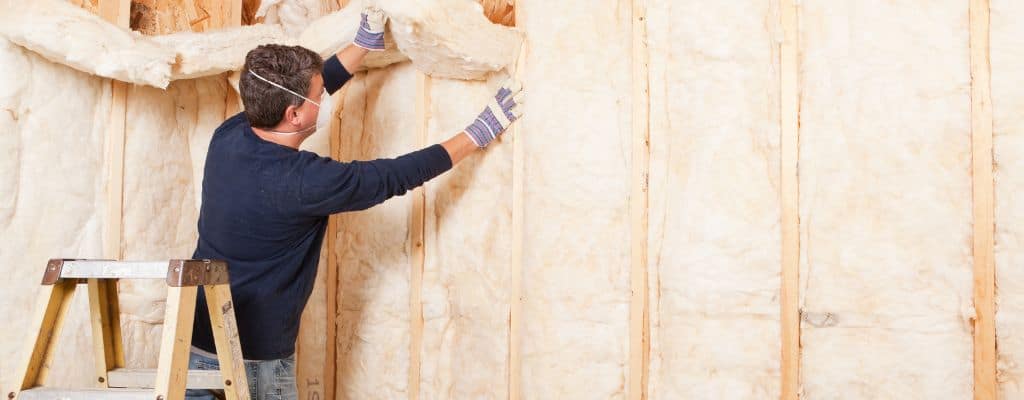When scouting for garage door insulation, several factors come into play to ensure you make an informed decision. The R-Value is crucial as a higher value signifies better thermal resistance. The material type—be it reflective foil, foam board, or batt insulation—will depend on your local climate and personal preferences. Ease of installation, cost, aesthetics, and durability are other vital considerations.
Moreover, in a time where environmental conservation is paramount, opting for eco-friendly insulation materials can also be a key consideration. All these factors intertwined will guide you in selecting the insulation that aligns with your needs and circumstances.
Keep reading to see what type of insulation is best for you!

Reflective Foil Insulation
Reflective foil insulation, also known as radiant barrier insulation, is designed to reflect radiant heat rather than absorbing it. It’s usually made from aluminum foil backed onto paper or plastic, and is installed in a way that faces an airspace to reflect radiant heat away from a living space or a garage, thereby keeping the area cooler in summer and warmer in winter. This type of insulation is especially effective in hot climates where it can significantly reduce cooling costs.
Top Reflective Foil Product
The SmartGARAGE Reflective Garage Door Insulation Kit is designed to reflect 95% of radiant heat, effectively insulating your garage to keep it warmer in winter and cooler in summer. The kit includes four rolls of reflective foil, which are easy to install with the included double-sided adhesive tape. By insulating your garage with the SmartGARAGE kit, you can create a more comfortable environment and potentially lower your energy bills.
Pros of Reflective Foil Insulation
Reflective foil insulation has several pros:
- Reflects Radiant Heat: Effectively reflects a significant portion of radiant heat to maintain a comfortable temperature.
- Energy Efficiency: Can help reduce energy costs by minimizing heat gain or loss.
- Lightweight: Easy to handle and install due to its lightweight nature.
- Versatile: Can be used in various parts of a home or building, including garages, attics, and walls.
- Moisture Resistant: Often resists moisture which can be beneficial in humid or damp conditions.
Cons of Reflective Foil Insulation
The cons of reflective foil insulation include:
- Limited Insulation: Primarily reflects radiant heat and may not provide sufficient insulation against conductive or convective heat.
- Cost: May be more expensive than other traditional insulation materials.
- Installation: Requires a proper installation with an air space facing the foil to function effectively.
- Aesthetics: The metallic appearance might not be aesthetically pleasing to some individuals.
- Durability: Can be easily punctured or damaged if not handled or installed carefully.

Foam Board Insulation
Foam board insulation consists of rigid panels of foam, often made from polystyrene, polyurethane, or polyisocyanurate. It provides good thermal resistance and can significantly reduce energy consumption when properly installed. These boards are lightweight, easy to cut and install, making them a popular choice for insulating walls, roofs, and foundations. They also provide some degree of sound dampening. However, they are not as effective in insulating against radiant heat compared to reflective foil insulation, and they may be more expensive.
Top Foam Board Product
The Matador Garage Door Insulation Kit is designed to provide an easy and cost-effective way to insulate your garage door, thereby increasing your home’s energy efficiency. The kit includes eight boards of high-impact polystyrene laminate which are easy to install with the included tools. Once installed, the insulation helps to keep your garage cooler in summer and warmer in winter, potentially reducing your energy bills. The Matador Kit is designed to fit standard garage doors and can be installed in less than an hour, making it a convenient choice for many homeowners.
Pros Of Foam Board Insulation
- High Insulation Value: Good thermal resistance per inch of thickness.
- Lightweight: Easy to handle and install.
- Moisture Resistant: Some types resist moisture and mold.
- Versatile: Suitable for various applications including walls, roofs, and garage doors.
- Sound Dampening: Can reduce noise transmission to some extent.
- Airtightness: Can contribute to airtightness if installed correctly, reducing drafts and energy loss.
Cons Of Foam Baord Insulation
- Cost: Can be more expensive compared to other insulation types.
- Environmental Concerns: Some foam boards are made from petrochemicals and may have a higher environmental impact.
- Flammability: Can be flammable and may emit toxic fumes when burned.
- Durability: Easily damaged by harsh impacts or pests.
- Installation Challenges: Incorrect installation can reduce effectiveness.
- Limited R-Value Stability: R-value can degrade over time in some foam insulations.
- Not Biodegradable: Disposal can be an issue as it doesn’t break down naturally.

Batt Insulation
Batt insulation consists of pre-cut panels of fiberglass or rock wool insulation. It’s a common type of insulation used in walls, attics, and floors due to its ease of installation and effective thermal resistance. The batts are designed to fit snugly between the studs, joists, or rafters of a building, providing a continuous layer of insulation that helps to keep the building warm in winter and cool in summer. It also offers some level of soundproofing, making it a good choice for interior walls as well.
Top Batt Insulation Product:Reach Barrier 3009
The Reach Barrier 3009 Garage Door Insulation Kit is designed to block up to 95% of radiant heat, enhancing the comfort and energy efficiency of your garage. This kit includes eight panels of insulation and is easy to install, making it a convenient choice for homeowners looking to improve their garage’s insulation. Its design enables it to cover an 8×8 ft garage door, providing a barrier against heat transfer and helping to maintain a more comfortable temperature in your garage year-round.
Pros of Batt Insulation
- Cost-Effective: Generally less expensive than other insulation types.
- Ease of Installation: Pre-cut panels fit easily between studs and joists.
- Effective Insulation: Good thermal resistance.
- Soundproofing: Provides some level of sound insulation.
Cons Of Batt Insualtion
- Gaps and Spaces: Improper installation can leave gaps, reducing effectiveness.
- Health Concerns: Fiberglass batts can irritate skin and respiratory tract.
- Moisture Sensitivity: Can absorb moisture, potentially leading to mold issues.
- Less Effective: Lower R-value per inch compared to foam insulations.
Takeaway
In conclusion, selecting the right garage door insulation is a multifaceted decision influenced by your local climate, budget, and the insulation’s R-value, among other factors. Whether you opt for reflective foil, foam board, or batt insulation, each has its merits and drawbacks. By weighing these factors against your personal needs and preferences, you can enhance your garage’s thermal efficiency, contribute to a more comfortable living environment, and possibly lower your energy bills in the long run.
